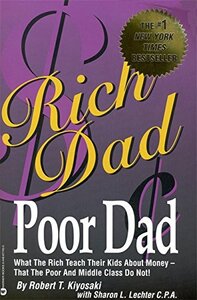Take a photo of a barcode or cover
2.05k reviews for:
Rich Dad, Poor Dad: What the Rich Teach Their Kids about Money – That the Poor and Middle Class Do Not!
Robert T. Kiyosaki
2.05k reviews for:
Rich Dad, Poor Dad: What the Rich Teach Their Kids about Money – That the Poor and Middle Class Do Not!
Robert T. Kiyosaki
challenging
informative
reflective
medium-paced
inspiring
medium-paced
informative
inspiring
fast-paced
did-not-finish, got halfway through and got the idea. It felt a bit old fashioned, had some good tips but wasn't getting much from it.
I listened to this audiobook together with my husband. Our 15 year old was laughing at the parts he would walk in on. When we asked him what was so funny, he said "The author goes on and on about how being highly educated isn't the path to wealth.....and then he writes a book educating people on how to become wealthy. It's ironic." Touchè, son, touchè. This book was so-so. It doesn't go into specifics about anything he did to acquire and accumulate his wealth. It was mostly about his childhood experiences and telling people to reframe their thinking surrounding wealth.
I don't think this book will help anyone get rich - and I don't think that is the book's intention - but there are some good ideas here. It was published in 1997, before 9/11, before the current recession, but many of the principles still make sense today.
I played his game Cash Flow a few years ago, but I'm only now beginning to understand what it was all about - mostly because I have committed many of the mistakes this book warns us about - including dipping into savings to pay credit card bills.
I don't think creating cash flow is as easy as the author would like us to believe. Nor do I believe he is as wealthy as he claims. Why would he spend all that time writing and then promoting a book if he's so busy being a successful investor?
But I do think there are a few important takeaways in the book: "pay yourself first"; "invest in things that will make money instead of drain money"; and "never dip into your savings".
I played his game Cash Flow a few years ago, but I'm only now beginning to understand what it was all about - mostly because I have committed many of the mistakes this book warns us about - including dipping into savings to pay credit card bills.
I don't think creating cash flow is as easy as the author would like us to believe. Nor do I believe he is as wealthy as he claims. Why would he spend all that time writing and then promoting a book if he's so busy being a successful investor?
But I do think there are a few important takeaways in the book: "pay yourself first"; "invest in things that will make money instead of drain money"; and "never dip into your savings".
I read this in a single day, in almost one sitting.
I can see why it appeals so widely, in that RD,PD is promising that wealth accumulation is simple if only you understand how to make your money work for you. Kiyosaki explains a good deal about corporations and tax sheltering, and why saving won't make you rich.
However, unlike most personal finance books, this book offers very little in the way of real guidance. Even the "ten steps" at the end of the book are but a meager introduction into how to follow in Kiyosaki's footsteps. So while it may snap your mindset a bit, it offers very little in the way of concrete advice.
One of the main problems I have with this book is that while Kiyosaki defines your wealth as "the number of days you could live off your assets," he continues through his vignettes to define "being rich" as being a multimillionare. I'm not even certain that he's aware of this, since he takes pains to define wealth in other ways related to freedom, but the overall impression he gives by telling his own story is that "rich" means getting millions of dollars of income our of your assets, in his case, mostly real estate.
If you're interested in real estate and its potential benefits, this is probably a good read. And the chapters on understanding liabilities vs. assets (and how many people put things that are really liabilities into the "asset" column) are good reads. But if you're looking for a book that will more accurately deal with the financial mindset you need to get ahead, and will deal with the reality that some people don't desire to make millions and millions, just to be financially secure, this book doesn't cut it.
I can see why it appeals so widely, in that RD,PD is promising that wealth accumulation is simple if only you understand how to make your money work for you. Kiyosaki explains a good deal about corporations and tax sheltering, and why saving won't make you rich.
However, unlike most personal finance books, this book offers very little in the way of real guidance. Even the "ten steps" at the end of the book are but a meager introduction into how to follow in Kiyosaki's footsteps. So while it may snap your mindset a bit, it offers very little in the way of concrete advice.
One of the main problems I have with this book is that while Kiyosaki defines your wealth as "the number of days you could live off your assets," he continues through his vignettes to define "being rich" as being a multimillionare. I'm not even certain that he's aware of this, since he takes pains to define wealth in other ways related to freedom, but the overall impression he gives by telling his own story is that "rich" means getting millions of dollars of income our of your assets, in his case, mostly real estate.
If you're interested in real estate and its potential benefits, this is probably a good read. And the chapters on understanding liabilities vs. assets (and how many people put things that are really liabilities into the "asset" column) are good reads. But if you're looking for a book that will more accurately deal with the financial mindset you need to get ahead, and will deal with the reality that some people don't desire to make millions and millions, just to be financially secure, this book doesn't cut it.
This was very close to being a 1 star book for me, but there was some information I guess could be helpful advice for certain people. Kiyosaki says himself he's a salesman, not a great writer which should give you a solid idea of how this books reads. He also talks a lot about different investing strategies that simply aren't available to the average investor.
He's also co-written multiple books with Donald Trump and frequently references him as a hero for his skills on negotiations.
He's also co-written multiple books with Donald Trump and frequently references him as a hero for his skills on negotiations.
New ideas. Different way of thinking about wealth, assets and liabilities. Think!
Chapter nine, the six-paged chapter, is really the only thing worth reading in this whole book, and even then, hardly worth it. Just go find any random investment 101 article on the internet and it'll probably work just as well. Going to use this book as padding for my archery targets.






